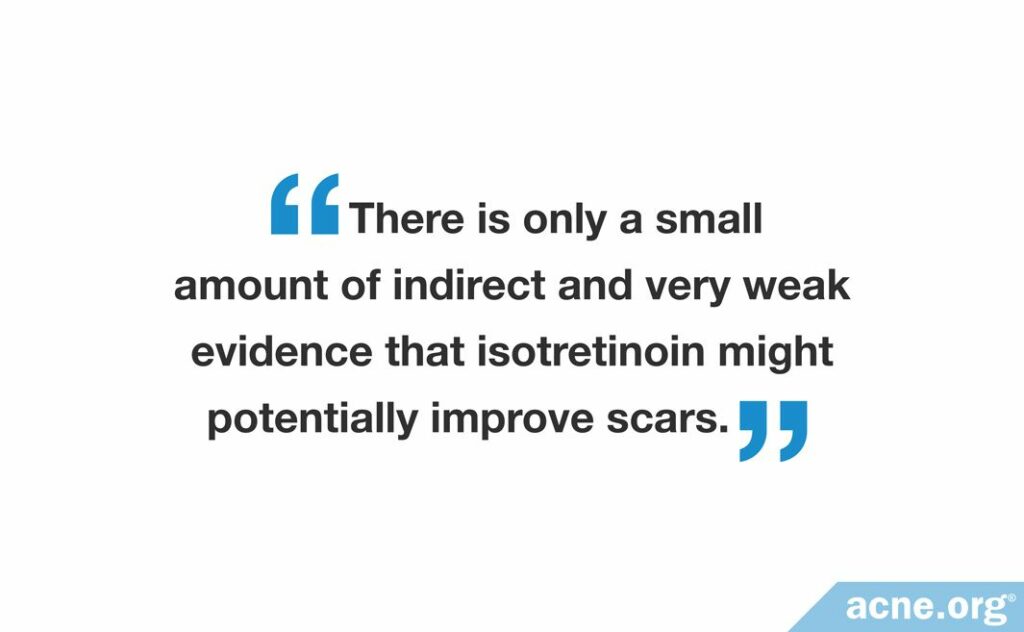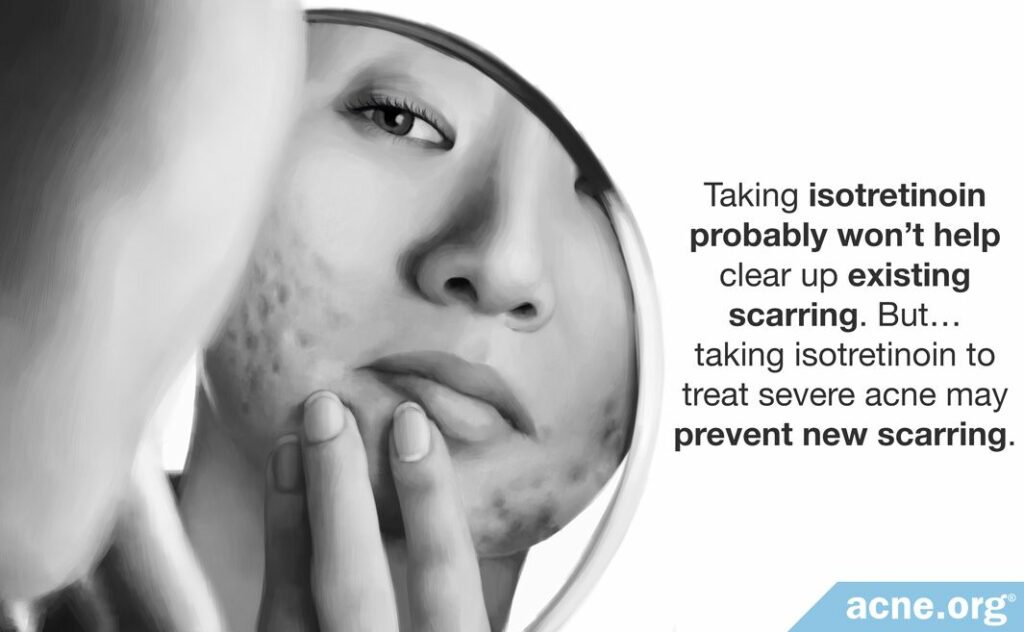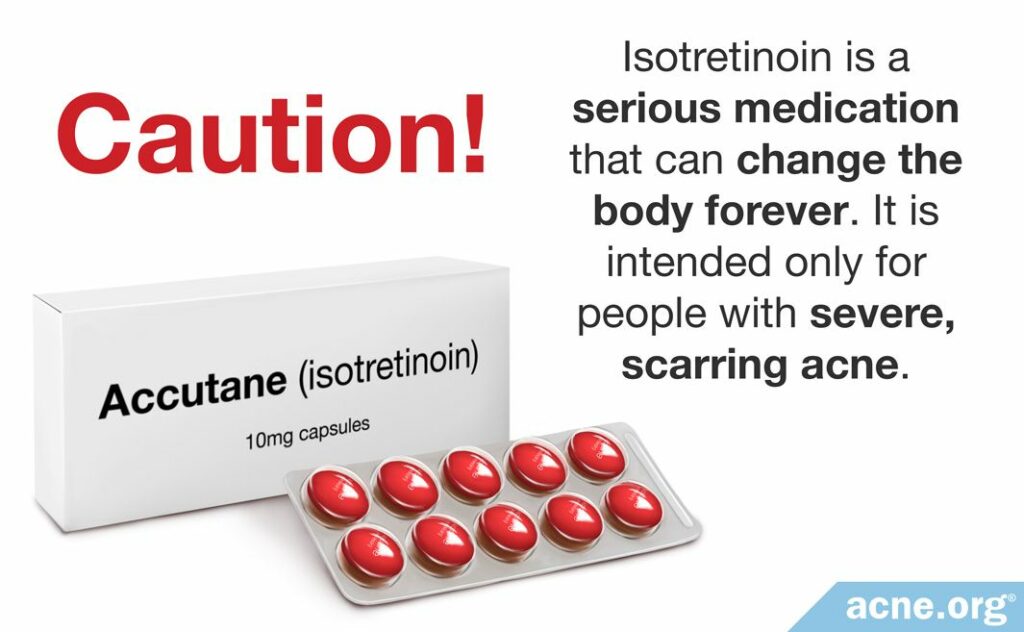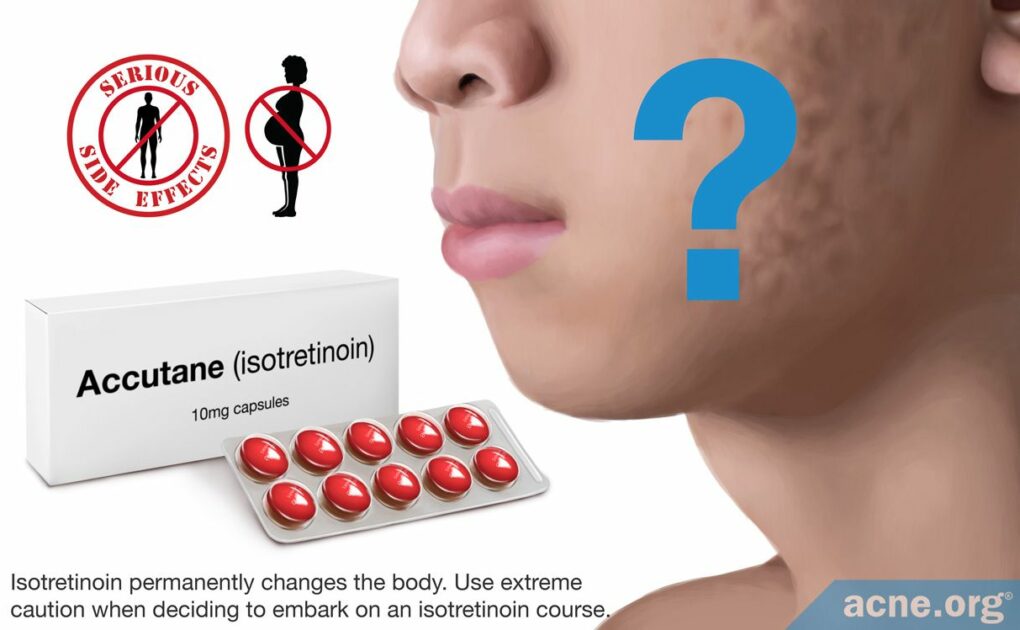No One Knows Whether Isotretinoin Can Treat Existing Scars, but It May Help Reduce Formation of New Scars in People with Severe Acne

The Essential Info
Isotretinoin, often known by its brand name Accutane®, is a powerful oral drug doctors sometimes prescribe to treat severe acne.
Some people also wonder if it could help with scars, however, to date, no studies have looked at whether it helps with acne scars in particular. We only have a minuscule amount of preliminary evidence from a few individual patients that suggest that taking a low dose of isotretinoin might have potential to speed up healing of other types of scars (in this case chickenpox scars). The bottom line is that we need much more research before we can claim that using isotretinoin will reduce the appearance of existing acne scars.
However, timely and effective treatment of acne–particularly severe acne–can help reduce the formation of scars in the first place. This is one of the major reasons why doctors prescribe isotretinoin. In short, while isotretinoin may or may not reduce the appearance of existing scars, it can prevent future scarring.
Caution – Side Effects: Isotretinoin is powerfully effective, but changes the skin and the body forever and comes with major side effects, some of which can be severe and/or lifelong. It also leads to birth defects and spontaneous abortion. For these reasons, taking this drug is a serious decision.

The Science
- Evidence That Isotretinoin Might Help Reduce Existing Scarring
- Isotretinoin Can Control Acne and Limit Formation of New Scars
Isotretinoin, often known by its brand name, Accutane®, is an oral drug for treating severe acne. It dramatically lowers skin oil production and can provide long-term remission of acne in about 2/3 of people.1,2 However, isotretinoin also comes with serious side effects, including the risk of birth defects, so you should perform extensive research before deciding whether to take it.
You may have heard people mention that isotretinoin might reduce existing acne scars as well. However, no studies have tested the claim that isotretinoin treats acne scars. Instead, there is only a small amount of indirect and very weak evidence that it might potentially improve other types of scars.

One thing we can say with confidence is that treating acne in a timely manner can help prevent scars from forming in the first place. If you have severe, widespread acne that is prone to scarring, you and your doctor may decide to have a conversation about taking isotretinoin to help reduce the number of new acne scars. However, remember that isotretinoin can cause serious side effects, so it is a last-resort medication to try only if other treatments have failed to control your acne.
Now let’s dig into the very preliminary evidence that suggests that isotretinoin might show some promise as a future scar treatment.
Evidence That Isotretinoin Might Help Reduce Existing Scarring
The best evidence we have that isotretinoin might reduce existing scars is very weak and comes from an article published in the journal Dermatologic Therapy that discusses three patients.
These patients took a low dose of oral isotretinoin for 1-4 months to treat scars left over from chickenpox. According to the study authors, two patients experienced a “moderate to excellent” improvement in the chickenpox scars, and the third experienced “excellent” improvement. The researchers said about this third patient, “Surprisingly, the post-[chickenpox] scars were…dramatically improved.”3
However, we should take these findings with a grain of salt for several reasons:
- The study only included 3 patients, which is a tiny sample.
- The patients had chickenpox scars, not acne scars.
- This was a type of study called a case study, which scientists consider to be the weakest form of evidence for a treatment.
- The researchers only provided a description of scar improvement without including any numbers or measurements.
In other words, while this result is encouraging and suggests that isotretinoin might be worth looking into as a scar treatment, this one case study is only a preliminary glance in the direction of whether isotretinoin might help with existing scars.
Expand to reveal details of case study

This article was published in the journal Dermatologic Therapy in 2018. The article reports on three patients with scars and skin darkening (hyperpigmentation) left over from chickenpox. The patients were two females, aged 14 and 20, and one 13-year-old male. The female patients took 20 mg of isotretinoin every other day while the male patient took 10 mg every other day. All three patients continued treatment for 1-4 months. All experienced improvement in scars as well as reduced skin darkening. However, the researchers did not measure or quantify the scar improvement.3
Apart from this case study, we have a bit of very indirect and mixed evidence showing that isotretinoin may affect skin thickness. Since scarred skin tends to be either abnormally thin or abnormally thick, evening out skin thickness could theoretically reduce scars. Let’s have a look.
Isotretinoin and skin thickness – mixed findings
This evidence comes from two studies looking at whether isotretinoin might help with skin aging due to sun damage (so-called photoaging).
One thing that happens in photoaging is that the skin loses collagen fibers, which are proteins that make the skin thick and youthful. When this happens, the skin can thin out and sag.
This is relevant for us because collagen is also a big player in acne scars. Indented (atrophic) scars, which are the most common type of acne scarring, occur when there is too little collagen in some spots. In other words, if research showed that isotretinoin might help increase the amount of collagen in the skin and even out skin thickness, that would be good news for acne scars.
However, the research findings are mixed:
- Study #1: This study looked at 24 people with photoaged skin. Half of these people took isotretinoin for 6 months while the other half used a retinoic acid cream on their skin instead. The researchers found no difference in the thickness of the skin between the two groups at the end of the study period. In other words, the isotretinoin did not seem to improve the skin thickness any better than the other retinoid cream.1,4 In fact, an article reviewing this research also noted that just using sunscreen would have achieved the same results.1
To sum up, this study found that isotretinoin is not a very promising treatment for restoring normal skin thickness and thus improving scars. - Study #2: This study looked at 33 people with photoaged skin. The participants were divided into two groups, both of which took isotretinoin three times a week for 3 months, but at different doses. Both groups experienced an increase in collagen fibers and an overall improvement in skin texture.1,4
This sounds like a great result, but the problem is that there was no control group. In other words, there were no study participants who went medication-free for comparison.
To sum up, this study’s findings are at best very weak evidence that isotretinoin might restore normal skin thickness and thus potentially improve scars.
Expand to reveal details of studies

The first study was published in the International Journal of Dermatology in 2014. The 12 people who took isotretinoin received a dose of 20 mg per day.

The second study was published in the Journal of the European Academy of Dermatology and Venereology in 2009. The first group of participants took 10 mg isotretinoin three times a week, while the second group of participants took 20 mg of isotretinoin three times a week.1,4
Summing up these two studies, so far, the evidence that isotretinoin might help with scars by increasing collagen is very weak and indirect.
Isotretinoin and scar development – it didn’t help

In this study, the researchers compared 122 patients taking oral isotretinoin with 66 medication-free patients. The scientists wanted to see whether taking isotretinoin made new scars from injury or surgery less likely to develop while the patients took the drug. They also wanted to see whether pre-existing injury or surgical scars might improve or perhaps worsen due to isotretinoin. However, they found no difference in new or old scars between the two groups of patients.5
In other words, taking isotretinoin made a person no more or less likely to form scars unrelated to acne. The researchers concluded that individual differences in the patients must have determined who ended up developing new scars and who did not.
Expand to reveal details of study

This study was published in the International Journal of Dermatology in 2016. It was a retrospective study, meaning that the researchers looked at medical records and examined patients who had taken isotretinoin in the past. The 122 patients in the study had all taken varying doses of oral isotretinoin, from 10 to 60 mg per day. In addition, the researchers looked at 66 control patients who never took isotretinoin but who were also seen by dermatologists during the same period.5
Isotretinoin Can Control Acne and Limit Formation of New Scars

Isotretinoin quickly brings acne under control and this decreases the formation of new acne scars.
But how do you know whether you might be a good candidate for taking isotretinoin? To help with this decision, the medical community has put together two sets of guidelines for dermatologists dealing with acne:
- Guidelines of Care: Acne Vulgaris Management, from the American Academy of Dermatology
- Evidence-Based Recommendations for Pediatric Acne, from the American Acne and Rosacea Society and the American Academy of Pediatrics6,7
These guidelines agree that that taking isotretinoin can be a good solution for people with:
- Severe acne: Many severe lesions
- Treatment-resistant acne: Acne that doesn’t respond to other treatments
- Scarring acne: Acne that may not be as severe but that tends to leave scars6,7

According to the guidelines published in the Journal of the American Academy of Dermatology in 2007, “It is the unanimous opinion of the acne work-group that oral isotretinoin is also useful for the management of lesser degrees of acne that are treatment-resistant or for the management of acne that is producing either physical or psychological scarring.”7
In other words, doctors believe that taking isotretinoin for people prone to scarring can help limit the formation of new acne scars.

Research also shows that treating acne with high doses of isotretinoin for long durations (approximately 6 months) can improve a person’s quality of life. This is probably because effective treatment reduces acne and limits new scars, which in turn improves self-esteem and makes the person more comfortable in social situations. As the researchers wrote in their 2012 article in the International Journal of Dermatology, “Long-term self-esteem-related issues arise if scarring develops.”8
In other words, if you feel that your acne and acne scars are severely affecting your enjoyment of life, isotretinoin may be worth considering.
Types of Acne Scars
Acne scars occur as a result of the inflammation (redness, soreness, and itching) in acne. Although most people with acne experience inflammation to some degree, not all develop scars, and doctors do not fully understand why this is.9
Scarring occurs when wound healing goes wrong and the processes of breaking down old collagen in the skin and building new collagen become unbalanced. Two types of scars can result:
- Indented (atrophic) scars: These result from too much collagen breakdown. Atrophic scars include ice pick scars, rolling scars, and boxcar scars. Atrophic scars are the most common type of acne scars.
- Raised (hypertrophic) scars: These result from too much collagen buildup. Hypertrophic scars include regular hypertrophic scars and keloid scars. Hypertrophic scars are a rarer type of acne scars.9
How Isotretinoin Treats Acne
Isotretinoin works against acne in several ways:
- Decreases skin oil: Isotretinoin shrinks skin oil glands and reduces the production of skin oil. Excess skin oil production is a key part of how acne develops.
- Blocks growth of acne bacteria: Isotretinoin stops acne bacteria from overgrowing by decreasing the skin oil they feed on. Overgrowth of acne bacteria is a major player in triggering redness in acne and making acne worse.
- Normalizes shedding of dead skin cells: Isotretinoin promotes the shedding of dead skin cells in a timely manner so they cannot clog pores. This helps prevent the formation of whiteheads and blackheads.2
The Bottom Line
We are far from having enough evidence to say whether isotretinoin can improve existing acne scars. However, doctors agree that isotretinoin can effectively treat severe acne and help limit the formation of new scars. This, in turn, can improve self-esteem and quality of life for people with acne.
References
- Forbat E, Ali FR, Al-Niaimi F. Dermatological indications for the use of isotretinoin beyond acne. J Dermatolog Treat. 29(7), 698-705 (2018). https://www.ncbi.nlm.nih.gov/pubmed/29480033
- Uptodate. Oral isotretinoin therapy for acne vulgaris. Available from: https://www-uptodate-com.eresources.mssm.edu/contents/oral-isotretinoin-therapy-for-acne-vulgaris?search=isotretinoin&source=search_result&selectedTitle=2~131&usage_type=default&display_rank=1#H2. Last cited: 21 January 2019.
- Dave DD, Abdelmaksoud A. Low dose isotretinoin for pigmented post-varicella scars. Dermatol Ther. e12768, (2018) [Epub ahead of print]. https://www.ncbi.nlm.nih.gov/pubmed/30296353
- Nickle SB, Peterson N, Peterson M. Updated Physician’s Guide to the Off-label Uses of Oral Isotretinoin. J Clin Aesthet Dermatol. 7(4), 22-34(2014). https://www.ncbi.nlm.nih.gov/pubmed/24765227
- Guadanhim LR, Gonçalves RG, Bagatin E. Observational retrospective study evaluating the effects of oral isotretinoin in keloids and hypertrophic scars. Int J Dermatol. 55(11), 1255-1258 (2016). https://www.ncbi.nlm.nih.gov/pubmed/27419807
- Leyden JJ, Del Rosso JQ, Baum EW. The use of isotretinoin in the treatment of acne vulgaris: clinical considerations and future directions. J Clin Aesthet Dermatol. 7(2 Suppl), S3-S21 (2014). https://www.ncbi.nlm.nih.gov/pubmed/24688620
- Strauss JS, Krowchuk DP, Leyden JJ, Lucky AW, Shalita AR, Siegfried EC, Thiboutot DM, Van Voorhees AS, Beutner KA, Sieck CK, Bhushan R; American Academy of Dermatology/American Academy of Dermatology Association. Guidelines of care for acne vulgaris management. J Am Acad Dermatol. 56(4), 651-63 (2007). https://www.ncbi.nlm.nih.gov/pubmed/17276540
- Cyrulnik AA, Viola KV, Gewirtzman AJ, Cohen SR. High-dose isotretinoin in acne vulgaris: improved treatment outcomes and quality of life. Int J Dermatol. 51(9), 1123-30 (2012). https://www.ncbi.nlm.nih.gov/pubmed/22909370
- Uptodate. Management of acne scars. Available from: https://www-uptodate-com.eresources.mssm.edu/contents/management-of-acne-scars?search=scarring acne&source=search_result&selectedTitle=1~28&usage_type=default&display_rank=1. Last cited: 21 January 2019.
 Acne.org Products
Acne.org Products